TV Review: Lost, Season 4
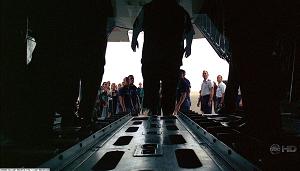 | | Season 4 was all about getting off |
Serialized dramas, mystery shows, and science-fiction all present unique problems as television programming. When a show is all three, the chances of it maintaining long-term success are fairly slim. It is therefore a testament to the makers of ABC’s hit show Lost that they’ve been able to keep the ratings relatively high throughout its first four years.
Shows like Lost—shows that rely on long-term payoffs and mysteries, science-fiction oddities, and serialized character arcs—can almost always maintain a cult following, but never much more than that. Lost is hardly the first successful mainstream serial, mystery show, or science-fiction drama, but the fact that it is all three and stands shoulder to shoulder in viewership with the always popular crime and hospital procedurals makes it unique in the annals of television history.
It is also unique in that, when an end date for the show was negotiated, it was not quietly passed on as bad news, but rather proudly publicized as an exciting turn of events. With the third season seeming to lose a great deal of momentum, it couldn’t have happened at a more critical time. The question going into the fourth season, then, is whether setting an end date has given the show a new edge and restored the show’s buzz.
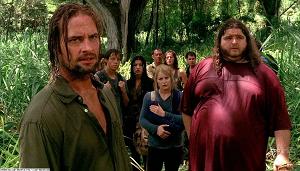 | | "What do you mean, we're out of coffee?" |
The answer, it seems, is yes. The first few episodes made it abundantly clear that the fourth season was going to have a fast pace, not postpone plotlines or elaborate on uninspired mysteries like where Jack got his tattoos, and continue mixing up its format to keep things interesting. While there were one or two underwhelming episodes, the vast majority of them were excellent, and when the strike happened, it stalled a show with a break-neck momentum. Luckily, when the show came back for its last few episodes, it didn’t slow down; if anything, it sped up even more.
The first episode of the season, “The Beginning of the End,” managed to tie up the loose ends of last year’s finale and set the stage for season four. Before the Lost logo even graced the television screen, the primary mystery of the season was outlined when Hurley, in a flashforward future, screams “I’m one of the Oceanic Six!” Meanwhile on the island, while getting all the characters back together just to split them up again seemed a little rushed and convenient, it set up the central conflict of that story. There were some odd and sloppy narrative choices in the episode, like Naomi’s return to life just so she can deliver a warning that didn’t really pay off that well and die again, but on the whole, “The Beginning of the End” was possibly the strongest season opener since the pilot.
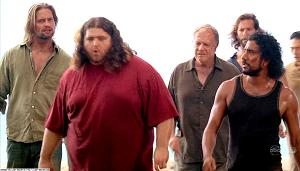 | | Who knew Hurley was such an awesome rapper? |
One of the biggest mysteries to come out of the last few episodes of season three was brought back to the forefront in the next episode, “Confirmed Dead,” which featured flashbacks for five different characters. The writers were able to give us a brief but perfectly adequate introduction to the new characters of the fourth season—the “freighties”: Daniel, Charlotte, Miles, and Frank—as well as frame them around their arrival on the island. Their purpose on the island was a mystery that threatened to drag on all season, but it was quickly answered when Miles held up a picture of Ben and announced their intentions. There’s more to the story, of course, but it was nice to be given such a straight-forward answer in a show known for never giving them.
Sayid—a character who got little love in Season 3—was revealed as one of the Oceanic Six, as well as an assassin for Ben, in the episode “The Economist.” It became abundantly clear by this episode which mysteries would drive the season and which characters would be critically important to the story. It was also a landmark episode in that we actually see two of the castaways get off the island.
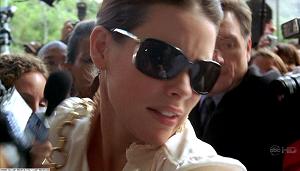 | | Kate gets off in many ways |
Unfortunately, the fourth episode of the season was the first real stinker. The season’s strong suit—its pace—was the episode’s undoing here, as Kate’s character arc was very quickly and sloppily tied off. The island story, dealing with Kate’s rather pointless antics in Locke’s camp, was frustrating and uninteresting, and the flashforward, in which Kate is forgiven for murder, robbery, multiple counts of fraud, obstructing justice, and evading federal authorites just because her mother didn’t want to testify against her.
The next episode, “The Constant,” would arguably be the season’s best, an announcement by the writers that yes, time travel is a part of the Lost mythology. Desmond’s romance with Penelope is brought back to the foreground for the most touching temporal love story in television history—replete with a tearjerking phone call on Christmas Eve—and some of the show’s major mysteries are addressed. A new term is even introduced into the pop-culture lexicon, and now there are geeks everywhere telling people that they’re their constant.
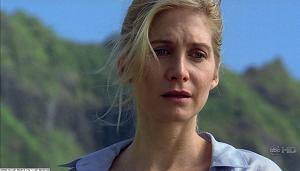 | | Sucks to be in a dumb episode, don't it? |
Though the episode that followed was probably the weakest of the season, it was able to address some lingering plot points from Season 3. “The Other Woman” featured some of the laziest left-field plot points in the show’s history, points that had never been mentioned before and would never be mentioned again, but it was a good idea for the show to reassure its audience that lingering character arcs and mysteries had not been forgotten.
Sun’s flashforward and Jin’s flashback episode is an unfairly maligned one by hardcore fans. It gives some early closure to a few lingering threads in Sun and Jin’s tumultuous love story, and it finally reveals the identities of the Oceanic Six. There are several good moments in the episode, and it is critical to set up future events. Additionally, the narrative trickery that seems to piss off some fans (for reasons I don’t understand) highlights that, no matter what, the writers reserve the right to keep us on our toes.
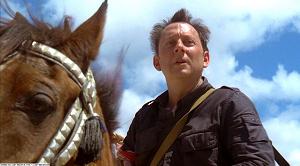 | | Ben's full of surprises |
I’ll talk more about the handling of Michael’s character in Season 4 later, but I will say that his flashback episode, “Meet Kevin Johnson,” was a great one. Not only are we shown Michael’s depressing journey back to the island, but we are also given glimpses of the enigmatic Libby, a couple of excellent scenes with the recently-deceased Tom, and a harrowing—if oddly placed—cliffhanger death.
The first episode after the strike was “The Shape of Things to Come,” an astonishingly fast-paced confrontation between the freighter mercenaries and Ben. Ben got a fascinating set of flash forwards, Alex got the most brutal execution in Lost history (beating out Anthony Cooper’s by a thin margin), the smoke monster got some much needed screen time, and Sawyer got to be the hero. This was an amazingly well-done episode, and it clearly set the stage for Season 5 while tying off the first threads of Season 4.
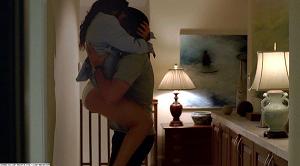 | | That's definitely something nice |
It would be impossible to make it through an entire season of Lost without getting a Jack-centric episode. “Something Nice Back Home” was a more methodically-paced episode than its predecessor, but it was no less masterful. We are finally shown some of the events that connect Jack’s seemingly happy future to the self-destructive hell we saw in the third season finale. Additionally, we see Christian Shephard again, both on the island and off of it, and we get to see Kate in her underwear. While the on-island story of Jack’s appentectomy was a bit weak, it was good to tie off the Jack-Juliet romance once and for all, securing the inevitability that, while Jack was assuredly leaving the island soon, Juliet was staying behind.
With all these flash-forward revelations about what’s going to happen in the future, it was odd to get a flashback episode right before the finale. However, the mind-boggling revelations in the flashbacks for “Cabin Fever” gave us a shocking glimpse to how deep the connection reaches between the island and John Locke. On the island, Locke goes to Jacob’s cabin and has a chat with Christian Shephard (as well as the creepiest version of Claire we’ve ever seen) before dropping the bombshell that he’s going to move the island. I thought this was the most exciting episode of the entire season, not because it had a bunch of action or because the character studies were so masterful, but because it put many of the show’s major mysteries back in the foreground, assuring the audience that these mysteries would be addressed.
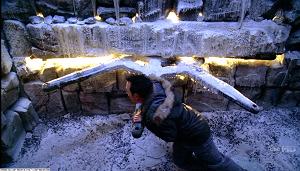 | | The frozen donkey wheel in action |
It’s hard to top Season 3’s intense finale, “Through the Looking Glass,” but “There’s No Place Like Home” gave it a good run for its money. While not as shocking as the moment when we learn Jack’s actually in the future, Season 4’s extended finale answered a lot of questions. There’s even a scene early on where a bunch of reporters get to ask many of the questions burning in the minds of fans everywhere. It successfully bridged the gap between the present and future (which begs the question of when the next season will take place), with only a handful of minor loose ends left over, like how exactly Sayid thought “with his heart instead of his gun.” Certainly, the moment when the island actually disappeared will turn away a small portion of viewers, but as with any show that relies heavily on a grand mystery, certain revelations will always disappoint certain people. However, having said that, I couldn’t be any less excited about where Lost is going next, so in that sense, the finale was an amazing success.
This is not to say Season 4 was devoid of problems.
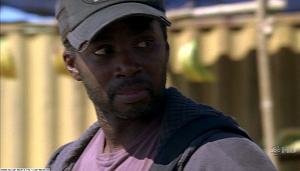 | | Not once does he scream, "Waaalt!" |
My primary complaint is the handling of the character of Michael. By the time he arrives in the seventh episode, the audience has already seen Harold Perrineau’s name in the opening credits seven times, not to mention the fact that his return was widely publicized before the season even started. Therefore, his surprising arrival in the story was anything but surprising (to the point that, when he steps out of the shadows, instead of cheering, many audience members sighed or groaned). Additionally, I find it odd that Harold Perrineau was credited as a main cast member for the entire season, even though he only appears in four episodes. Several guest stars, including Sam Anderson, Kevin Durand, John Terry, and the great Jeff Fahey, are in more episodes than Harold.
The biggest problem with Michael’s return, though, is his apparent meaninglessness in the plot, highlighted by his ultimate death in the finale. Though I disagree with his statements on racial discrimination by the show’s writers, I do agree with Harold’s recently vocalized disappointment with how his character was used in Season 4. He had a lot of potential for the story, but it became abundantly clear by the end that he was brought to the show just to die.
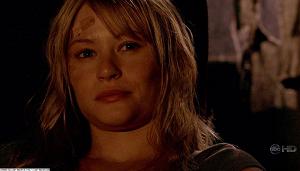 | | Cut her some slack; sometimes you get so carried away talking to your ghost father that you forget about your baby and dead boyfriend |
Also, a lot of other character stories in Season 4 seemed to be more about wrapping up loose ends than exploring dynamics. This isn’t true in all cases, but it felt like a lot of characters, including Kate and Sun, were given premature swan songs so that they could be morphed into completely different characters in the final act of the grand mythos. There were also a few characters who were victims of the truncated season, like Sawyer and Claire, characters who felt more like guest stars than series regulars by virtue of their lack of character-centric episodes. I’m not arguing that this is something that was avoidable, but it nonetheless feels dissatisfying.
Speaking of Claire, the handling of her character was most unusual. While she showed an appropriate amount of grief for Charlie’s death in the season opener, she spent much of the rest of the season acting happy-go-lucky and thrilled to be hanging laundry or pouring tea for Kate and Sawyer. Many of the important elements set up before Charlie’s death, like his bequething his list of “greatest hits” and his Dexter Stratton ring, along with Desmond’s precognitive vision of Claire and Aaron getting on a helicopter, were completely ignored throughout the season, and this felt more like a disappointing oversight on the part of the writers rather than a deliberate exclusion.
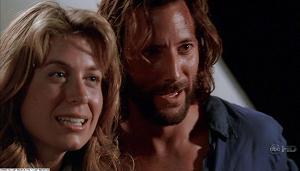 | | They get half a star just for reuniting these two |
And then there’s the untimely death of Danielle Rousseau, an event that clearly was not intended by the writers. I’ve read that the actress, Mira Furlan, wanted off the show, mostly because she was tired of living in Hawaii, and that’s aggravating considering the plans the showrunners had for her. She may return to wrap up her promised backstory, but now that her character is definitely dead, such a return would be more difficult to arrange. In retrospect, her sudden and out-of-place execution immediately before the writer’s strike makes sense, but it is still annoying, especially when certain details like Horace telling Locke that the purge happened while Danielle was on the island have come out in the narrative.
Despite all of these complaints, though, Season 4 of Lost is masterful. The writers continue to impress, with their never-ending allusions to literature, philosophy, and religion, their brilliant narrative construction, and their infuriatingly wonderful mysteries, answers, and questions. The story of the Oceanic Six and how they get off the island is compelling, the evolution of the characters is natural without being overly predictable, and the perfect peeling away of narrative layers continues to make for the best television has to offer.
-e. magill, 06/02/2008
|
|